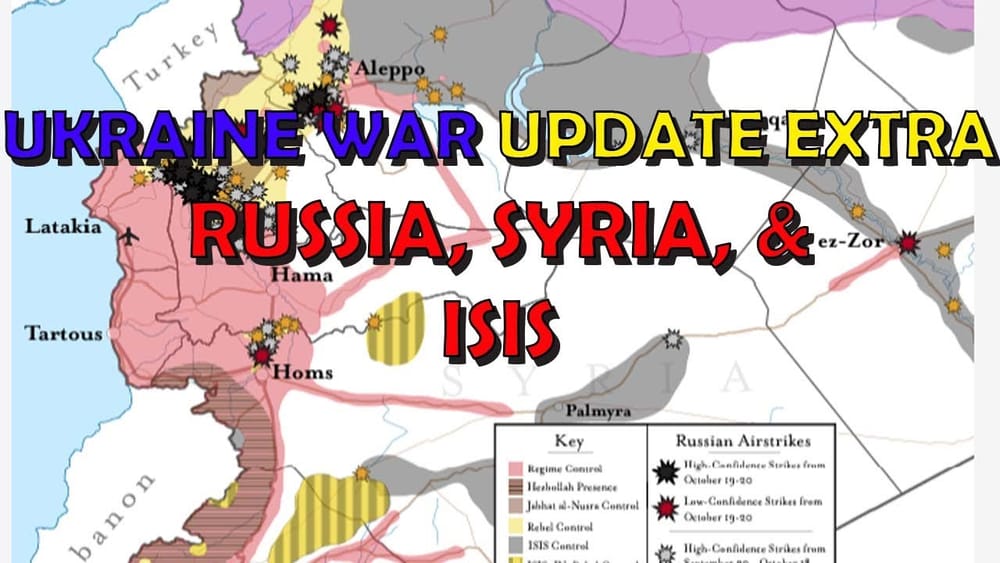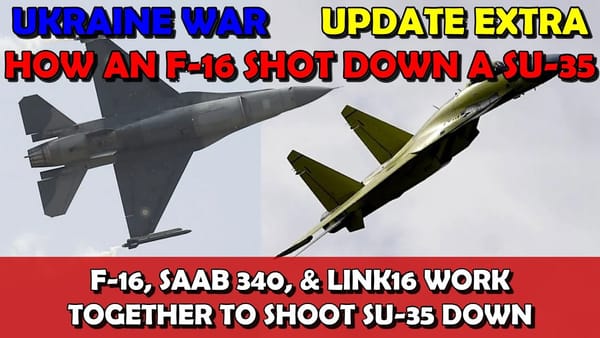Ukraine War Upd. EXTRA: Russia, Syria, & ISIS
Table of Contents 📖
"If you're a troll on the threads at the moment to my videos trying to support, if you're someone in America or Europe or wherever who is sort of anti-Ukraine, someone like Elon Musk, David Sacks, like, who are you? Who are you getting into bed with?"
Hello Team
🎦 00:00-01:26⏩
Jonathan welcomes viewers to an "extra" update on the Ukraine War, focusing on Russia, the Moscow terror attack, and ISIS. He acknowledges that his videos can be lengthy and encourages viewers to adjust the playback speed using the settings cogwheel. He also shares a handy tip for mobile viewers: holding a thumb on either side of the screen while in landscape mode will automatically set the speed to 2x, facilitating faster content consumption.
Return to top⤴️
Jennifer Caffarella (ISW) on Russia and ISIS
🎦 01:26-02:54⏩
Jonathan introduces a Twitter thread by Jennifer Caffarella from the Institute for the Study of War (ISW), which delves into the complex relationship between Russia and ISIS. Caffarella argues that Russia hasn't prioritised fighting ISIS in Syria and suggests that the recent Moscow attack was likely a genuine act of terrorism by ISIS. He emphasizes the need to provide context for new viewers before diving deeper into the thread.
Return to top⤴️
Russia's Strategic Objectives in the Mediterranean
🎦 02:54-07:49⏩
Jonathan provides a geopolitical overview of Russia's strategic interests, particularly their desire for influence in the Mediterranean region. He argues that Russia's annexation of Crimea in 2014 was driven by the strategic importance of Sevastopol as a warm water deep sea port. This port grants Russia access to the Mediterranean and beyond, facilitating trade and projecting military power. He highlights the limitations of Russia's other ports which are largely frozen for part of the year. He then connects this to Russia's involvement in the Syrian civil war, asserting that their support for the Assad regime is primarily motivated by access to Syrian ports on the Mediterranean.
Return to top⤴️
Russia's Intervention in the Syrian Civil War
🎦 07:49-10:15⏩
Jonathan delves into the complexities of the Syrian Civil War, highlighting the involvement of multiple actors, including Russia, the US, and various rebel groups. He posits that Russia's intervention in 2015, after the Assad regime faced significant setbacks, aimed to stabilise Assad's rule and establish a strategic foothold in the region. He notes that Russia prioritised targeting moderate rebel groups deemed a threat to Assad's regime over combating ISIS, contrary to the US's objectives. He emphasizes Turkey's strategic importance as a NATO member controlling the Bosporus Strait, which has prevented the Russian fleet from entering the Black Sea since the start of the Ukraine war.
Return to top⤴️
US and Russian Objectives in Syria
🎦 10:15-18:49⏩
Jonathan contrasts the diverging objectives of the US and Russia in Syria. The US, primarily focused on countering the global threat of ISIS, engaged in operations against the group in eastern Syria while largely ignoring the fight for Syria's political future in the west. Jonathan argues that this approach, while seemingly beneficial to Assad, was driven by the greater priority of defeating ISIS. He then shifts to outlining the ISW's assessment of Russia's broader strategic goals, which include diminishing US influence, rebuilding Russian military power, expanding influence in the Middle East, and undermining the EU and NATO. He criticises Russia's actions in Syria, including the indiscriminate bombing of civilian areas and their role in exacerbating the refugee crisis, suggesting that these actions align with Russia's strategy of destabilising the EU. Jonathan draws parallels to Russia's current actions in Ukraine, cautioning those who downplay Russia's aggression by pointing to their brutal tactics in Syria.
Return to top⤴️
Russia's Short-Sighted Strategy in Syria
🎦 18:49-23:30⏩
Jonathan criticises Russia's approach in Syria, arguing that their focus on propping up Assad and securing their own interests has come at the expense of a stable and peaceful Syria. He suggests that by prioritising the elimination of moderate rebel groups open to negotiation, Russia inadvertently paved the way for the dominance of jihadist factions within the opposition. He further contends that Russia's actions, including the alleged facilitation of Russian and Chechen jihadist fighters into Syria, demonstrate a lack of foresight and a coherent counter-terrorism strategy. He condemns Russia's brutal military tactics, particularly the targeting of civilians and hospitals, drawing parallels to their actions in the ongoing Ukraine war.
Return to top⤴️
The Moscow Terror Attack and Its Implications
🎦 23:30-24:20⏩
Jonathan circles back to the recent terror attack in Moscow, suggesting that it appears to be a genuine ISIS operation rather than a false flag attack orchestrated by Russia. He posits that the presence of fighters from former Soviet republics, such as Chechnya, within the ranks of ISIS in Syria may have contributed to this attack. The radicalisation and anti-Russian sentiment fostered among these fighters during their time in Syria could potentially motivate attacks within Russia itself.
Return to top⤴️
Wrap up
🎦 24:20-24:49⏩
Jonathan concludes the video by expressing his hope that the analysis of the ISW thread provided valuable insight into the complexities of Russia's involvement in Syria. He encourages viewers to share their thoughts on the topic and signs off, promising to return with more updates soon.
Return to top⤴️



